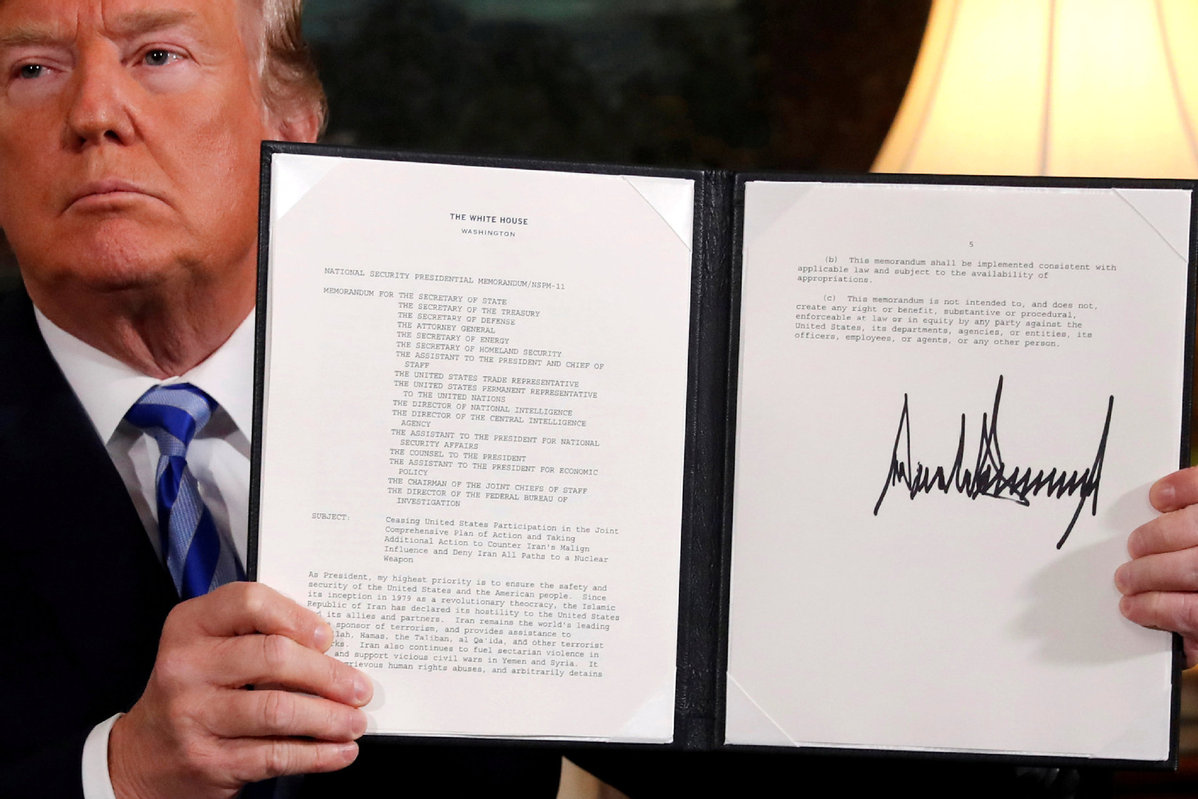US opens Pandora's box with Iran policy
By Ma Xiaolin | China Daily | Updated: 2018-06-08 07:45

Iranian President Hassan Rouhani will attend the 18th Shanghai Cooperation Organization Summit in Qingdao, Shandong province, on Saturday and Sunday as the leader of an observer country in the SCO. Although Rouhani's attendance is a routine affair, some Western media outlets may use it to speculate that he will urge SCO member states to take some countermeasures against the US' withdrawal from the Iran nuclear deal.
Such speculation would be ridiculous. However, it's high time for the US to reflect on the severe consequence of its unilateral pull-out of the deal.
The US' withdrawal from the Joint Comprehensive Plan of Action and re-imposition of sanctions on Iran could eventually force the other five countries that signed the JCPA to stop cooperating with Iran. That would render the deal all but dead.
Unfortunately, the JCPA has a relatively weak legal status in the United States because the Barack Obama administration traded off its submission to Congress for approval to sustain the nuclear non-proliferation regime. Still, as a document endorsed by seven countries and backed by the United Nations, the validity and binding force of the JCPA are indisputable.
The key to the problem, however, lies not in the hands of the other five countries, which still value the Iran nuclear deal and have been defending it, because the US has not only threatened to impose "the strongest sanctions in history" on Iran, but also vowed to "punish" any company that continues to invest in or trade with any Iranian entity.
Despite being opposed to Washington's oppressive and capricious moves, no country alone can afford to bear the brunt of a trade war started by the US given its economic, technological, financial and military might. For instance, trade between the Europe Union and the US amounted to $700 billion in 2017 with the EU enjoying a trade surplus of $151.4 billion, while the total trade between the EU and Iran added up to just $25 billion. This huge trade gap would put immense economic pressure on the signatories to the JCPA, preventing them from taking counter-measures against the US action.
On the other hand, Russia, which many believe has been drawn into a new "Cold War" by the US, could afford to maintain its trade ties with Iran because US sanctions against Russia have further reduced the $50 billion US-Russian trade volume. Besides, the US does not have enough leverage to restrict Russian-Iranian trade. But despite this, Lukoil, Russia's second-largest oil producer, has announced suspension of investment in Iran so as to avoid US sanctions. And even if Lokoil had not suspended its investment in Iran, Russia alone cannot sustain the Iran nuclear deal.
US Secretary of State Mike Pompeo recently said Iran has to meet 12 tough demands to seek relief from sanctions. But in exchange for the "ultimate normalization" of Washington-Teheran relations and removal of high-tech blockade, as promised by the US, Iran has to give up its independent foreign policy, stop supporting Hezbollah in Lebanon and the Houthi rebels in Yemen, and withdraw all its forces from Syria. The US' demands are too difficult for Iran to meet.
Not surprisingly, Iran's supreme leader Ayatollah Ali Khamenei said on Monday that he had ordered the country's Atomic Energy Organization to prepare to increase uranium enrichment, although it will remain within the framework of the Iran nuclear deal for the time being. To every peace-lover's horror, the Pandora's box in the Middle East, which was sealed three years ago thanks to the JCPA, has been forced open again. Tragically, the consequences of this irrational US action will be suffered not only by the Middle East countries but also many other countries.
And if the US believes, it will not pay a price for its irresponsible and provocative actions, it is wrong. So, it's time the US reflected on its irrational, harmful, unilateral moves and returned to the civilized way of settling issues.
The author is a professor at Beijing Foreign Studies University.
























